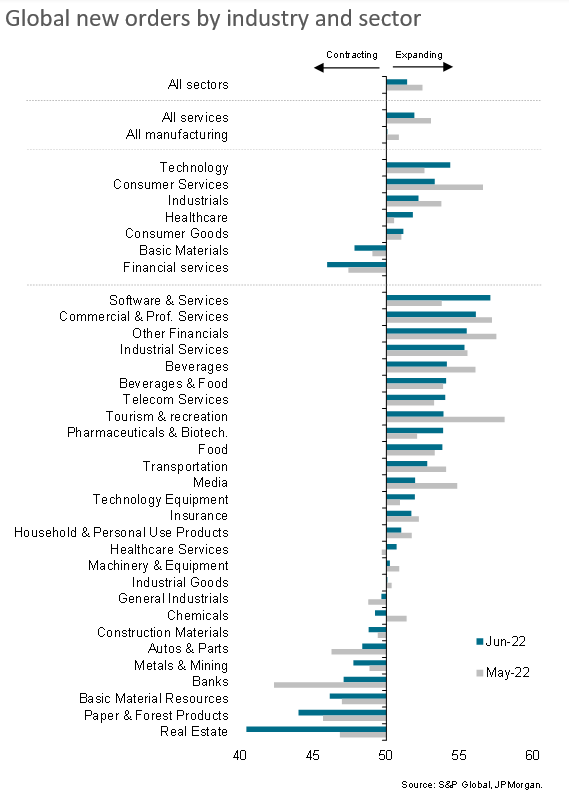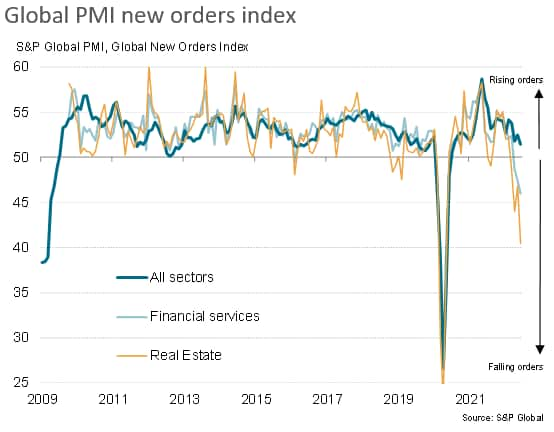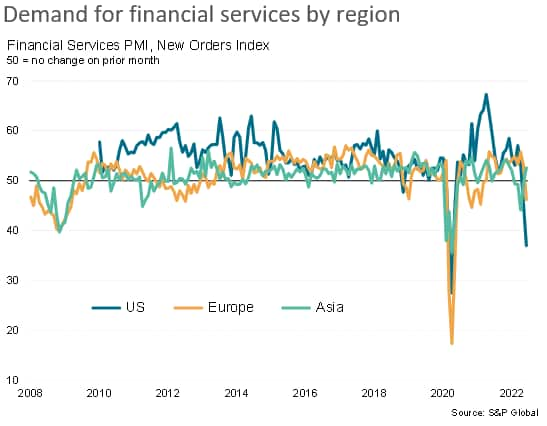Customer Logins
Obtain the data you need to make the most informed decisions by accessing our extensive portfolio of information, analytics, and expertise. Sign in to the product or service center of your choice.
Customer Logins
ECONOMICS COMMENTARY
Jul 07, 2022
Global real estate choked by rising interest rates, leads economic slowdown
Detailed sector PMI data compiled by S&P Global, derived from information provided by panels of over 30,000 companies in 45 countries, reveals demand falling in nine of the 26 detailed sectors covered by the surveys, with by far the steepest contraction recorded for real estate amid tightening financial conditions and the rising cost of living.
New orders placed for goods and services rose worldwide in June at the slowest rate for nearly two years, according to S&P Global's PMI survey data, registering only a modest expansion of demand during the month. A breakdown of the data revealed that the slowdown was led by a sharp drop in orders for financial services, and for real estate activities in particular.
New orders for financial services in fact fell for a third successive month in June, with the latest decline the steepest recorded since May 2020.
The real estate segment of financial services meanwhile saw new orders fall for a fourth straight month in June, with the rate of reduction also running at the steepest since May 2020.
To underscore the severity of the latest drop in demand for financial services and real estate in particular, barring the pandemic shutdowns of early 2020, these latest declines are far greater than any downturns seen since comparable PMI data at the sector level were available in late 2009.
Banking firms also saw new orders fall, dropping for a second month in a row, albeit at a reduced rate of contraction, thereby also marking the sector's worse performance since the early pandemic business closures.
Future prospects also look especially gloomy for financial services and notably for real estate. The PMI's future expectations index, which measures anticipated business activity in the coming year, was the lowest seen in all industries and sub-sectors respectively for financial services and real estate.
New orders for financial services fell especially sharply in the US, down for a second month in a row and dropping at a rate exceeded since 2009 only by the drop recorded in April 2020.
In Europe, financial service sector new orders fell for the first time since March 2021, with real estate new business inflows dropping for a second month and at an accelerated rate.
In Asia, in contrast, financial services firms reported a rise in new orders for the first time since January, largely reflecting a reopening of the economy in mainland China, though real estate new work fell for a sixth successive month, albeit with the rate of decline easing.
While the divergence in demand for financial services between Asia and the west in part reflects the recent reopening of parts of the Chinese economy since the easing of the Omicron wave, the downturn in demand in the US and Europe also reflects rising interest rates and tightening financial conditions more generally in these economies, according to anecdotal evidence provided by PMI survey contributors.
Chris Williamson, Chief Business Economist, S&P Global Market Intelligence
Tel: +44 207 260 2329
chris.williamson@spglobal.com
© 2022, IHS Markit Inc. All rights reserved. Reproduction in whole
or in part without permission is prohibited.
Purchasing Managers' Index™ (PMI™) data are compiled by IHS Markit for more than 40 economies worldwide. The monthly data are derived from surveys of senior executives at private sector companies, and are available only via subscription. The PMI dataset features a headline number, which indicates the overall health of an economy, and sub-indices, which provide insights into other key economic drivers such as GDP, inflation, exports, capacity utilization, employment and inventories. The PMI data are used by financial and corporate professionals to better understand where economies and markets are headed, and to uncover opportunities.
This article was published by S&P Global Market Intelligence and not by S&P Global Ratings, which is a separately managed division of S&P Global.
{"items" : [
{"name":"share","enabled":true,"desc":"<strong>Share</strong>","mobdesc":"Share","options":[ {"name":"facebook","url":"https://www.facebook.com/sharer.php?u=http%3a%2f%2fstage.www.spglobal.com%2fmarketintelligence%2fen%2fmi%2fresearch-analysis%2fglobal-real-estate-choked-by-rising-interest-rates-leads-economic-slowdown-June22.html","enabled":true},{"name":"twitter","url":"https://twitter.com/intent/tweet?url=http%3a%2f%2fstage.www.spglobal.com%2fmarketintelligence%2fen%2fmi%2fresearch-analysis%2fglobal-real-estate-choked-by-rising-interest-rates-leads-economic-slowdown-June22.html&text=Global+real+estate+choked+by+rising+interest+rates%2c+leads+economic+slowdown+%7c+S%26P+Global+","enabled":true},{"name":"linkedin","url":"https://www.linkedin.com/sharing/share-offsite/?url=http%3a%2f%2fstage.www.spglobal.com%2fmarketintelligence%2fen%2fmi%2fresearch-analysis%2fglobal-real-estate-choked-by-rising-interest-rates-leads-economic-slowdown-June22.html","enabled":true},{"name":"email","url":"?subject=Global real estate choked by rising interest rates, leads economic slowdown | S&P Global &body=http%3a%2f%2fstage.www.spglobal.com%2fmarketintelligence%2fen%2fmi%2fresearch-analysis%2fglobal-real-estate-choked-by-rising-interest-rates-leads-economic-slowdown-June22.html","enabled":true},{"name":"whatsapp","url":"https://api.whatsapp.com/send?text=Global+real+estate+choked+by+rising+interest+rates%2c+leads+economic+slowdown+%7c+S%26P+Global+ http%3a%2f%2fstage.www.spglobal.com%2fmarketintelligence%2fen%2fmi%2fresearch-analysis%2fglobal-real-estate-choked-by-rising-interest-rates-leads-economic-slowdown-June22.html","enabled":true}]}, {"name":"rtt","enabled":true,"mobdesc":"Top"}
]}








